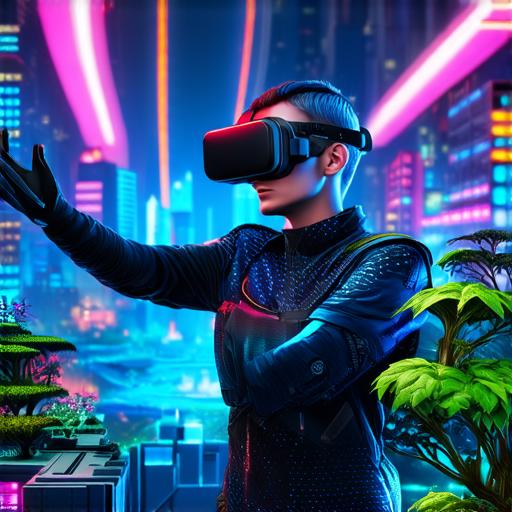Benefits of Virtual Reality
Virtual reality has many benefits that can positively impact society. One of the most significant advantages of VR is its ability to provide immersive experiences that can enhance learning, training, and entertainment. For example, virtual reality simulations can be used in healthcare to train medical professionals for complex procedures or surgeries. This can reduce the risk of errors and improve patient outcomes.
Similarly, VR can also be used in education to simulate real-world scenarios and help students understand complex concepts more easily.
Another benefit of VR is its ability to create more engaging forms of entertainment. Games, movies, and other interactive experiences can be made even more immersive with the use of VR technology, allowing users to feel like they are a part of the story or action. This has the potential to increase engagement and retention in these activities, as well as promote social interaction and collaboration among users.
Challenges of Virtual Reality
Despite its many benefits, virtual reality also presents several challenges for society. One of the most significant concerns is the potential for addiction and negative effects on mental health. Prolonged use of VR technology can cause motion sickness, anxiety, and even depression in some users.

In addition, there are ethical considerations associated with VR technology, such as the potential for it to be used to manipulate or deceive individuals. For example, a company could create a virtual reality experience that simulates a dangerous environment or situation to test an individual’s limits of endurance, without their consent.
Another challenge of VR is its potential impact on social interaction and communication. While virtual reality can provide immersive and engaging experiences, it may also lead to a decrease in face-to-face interactions and increased social isolation for some users. This could have negative effects on mental health and relationships, as well as impact the development of critical social skills.
Real-Life Examples of Virtual Reality in Action
There are many real-life examples of how virtual reality is being used to improve society. One such example is the use of VR technology in the healthcare industry. For instance, the company Medical Realities creates virtual reality simulations that allow medical students to practice surgical procedures and other medical tasks in a safe and controlled environment. This can provide valuable training for medical professionals and reduce the risk of errors and complications during actual surgeries.
Another example is the use of VR technology in the education sector. The company Nearpod VR offers virtual field trips for students that allow them to explore historical sites, scientific phenomena, and even outer space from the comfort of their classrooms. This can provide an immersive and engaging learning experience for students, as well as promote social interaction and collaboration among classmates.
Future Applications of Virtual Reality
Virtual reality technology is constantly evolving, and there are many potential future applications that could positively impact society. For instance, VR technology could be used to create more realistic and immersive forms of remote communication, allowing people to feel like they are in the same room even when they are thousands of miles apart. This could have significant implications for businesses, education, and social interaction, as well as promote global collaboration and understanding.
Additionally, VR technology could be used to create more effective forms of therapy for individuals with mental health issues such as PTSD or anxiety disorders. Virtual reality simulations could be used to expose individuals to triggering situations and help them learn coping strategies in a controlled environment. This could provide valuable support and treatment for those who may not have access to traditional therapies.
FAQs
Q: What are the potential negative effects of virtual reality on mental health?
A: Prolonged use of VR technology can cause motion sickness, anxiety, and depression in some users. It can also lead to social isolation and decreased face-to-face interactions, which could have negative effects on mental health.
Q: Can virtual reality be used to manipulate or deceive individuals?
A: Yes, there are ethical considerations associated with VR technology that must be taken into account. It is important for developers to consider the potential impact of their creations on individuals and society as a whole, and to take steps to mitigate any negative effects.
Q: What are some real-life examples of how virtual reality is being used?
A: Virtual reality is being used in a variety of industries, including healthcare, education, and entertainment.
